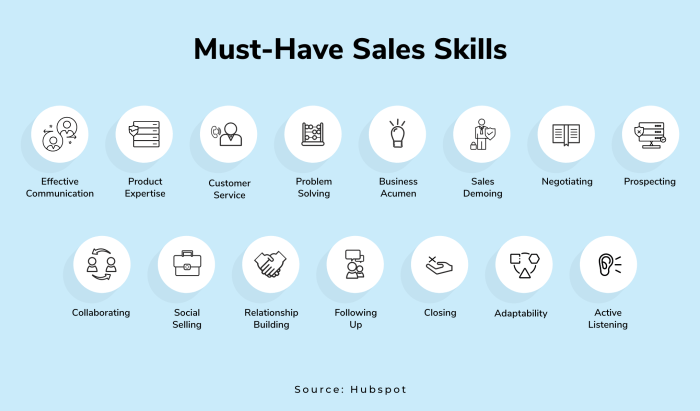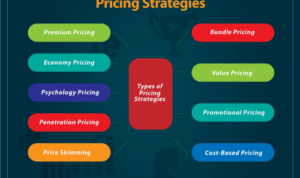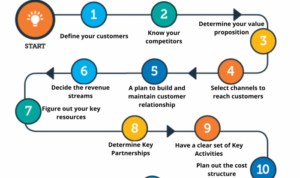Developing Sales Skills takes center stage, inviting you into a world of growth and achievement. Get ready to dive deep into the key strategies and techniques that can elevate your sales game to new heights.
Importance of Developing Sales Skills
Developing sales skills is crucial for professionals in various industries as it enables them to effectively communicate, persuade, and close deals with clients. Whether you work in retail, real estate, technology, or any other field, having strong sales skills can greatly impact your career growth and success.
Career Growth and Success
Strong sales skills can open doors to new opportunities and promotions within your organization. By being able to effectively sell products or services, you can showcase your value to your employer and stand out among your peers. This can lead to increased responsibilities, higher salaries, and overall career advancement.
Benefits of Honing Sales Skills, Developing Sales Skills
- Improved Communication: Developing sales skills helps you become a better communicator, both with clients and colleagues. This can lead to better relationships, increased collaboration, and overall success in your professional endeavors.
- Increased Confidence: As you hone your sales skills and see success in closing deals, your confidence will naturally grow. This newfound confidence can spill over into other areas of your life, leading to personal growth and development.
- Enhanced Problem-Solving: Sales skills require you to think on your feet, adapt to different situations, and find creative solutions to challenges. By honing these skills, you become a more effective problem-solver, which can benefit you both professionally and personally.
Key Sales Skills to Develop

Developing key sales skills is crucial for success in the competitive world of sales. By honing these essential skills, individuals can effectively connect with customers, build relationships, and ultimately close more deals. Let’s explore some of the key sales skills that individuals should focus on developing to excel in the sales process.
Effective Communication Skills
Effective communication is at the core of successful sales. Being able to clearly articulate product features, benefits, and value propositions is essential in convincing potential customers to make a purchase. Additionally, active listening skills play a crucial role in understanding customer needs and addressing their concerns.
- Practice active listening by focusing on the customer’s needs and responding thoughtfully.
- Work on refining your verbal and non-verbal communication skills to build rapport with customers.
- Utilize storytelling techniques to engage customers and convey the value of your product or service effectively.
Emotional Intelligence
Emotional intelligence is the ability to recognize and manage emotions – both your own and others’. In sales, having high emotional intelligence can help build trust with customers, handle objections effectively, and navigate challenging situations with ease.
- Develop self-awareness to understand your own emotions and reactions in sales interactions.
- Practice empathy to connect with customers on a deeper level and understand their perspectives.
- Hone your social skills to build strong relationships and trust with customers throughout the sales process.
Negotiation Skills
Negotiation skills are crucial in closing deals and reaching mutually beneficial agreements with customers. By mastering negotiation techniques, sales professionals can overcome objections, handle price discussions, and secure successful outcomes.
- Understand the needs and priorities of both parties to create win-win solutions during negotiations.
- Practice active listening and effective questioning to uncover hidden objections and concerns.
- Learn to be assertive yet flexible in negotiations to achieve the best possible outcomes for both parties.
Techniques for Improving Sales Skills

To become a top-notch salesperson, it’s crucial to continuously work on honing your skills. Here are some effective strategies to help you improve your sales skills on a regular basis.
Consistent Practice and Role-Playing
Engage in regular role-playing exercises with colleagues or mentors to simulate real sales scenarios. This allows you to practice different sales techniques and improve your communication skills effectively.
Continuous Learning and Training
Stay updated with the latest sales trends and strategies by attending workshops, seminars, or online courses. Invest in your professional development to gain new insights and approaches to sales.
Seek Feedback and Implement Changes
Don’t shy away from seeking feedback from customers, colleagues, or supervisors. Take constructive criticism positively and make necessary changes to your sales approach to enhance your performance.
Utilize Technology and Tools
Take advantage of sales automation tools, CRM software, and other technology to streamline your sales process. These tools can help you track leads, manage customer relationships, and improve your overall efficiency.
Networking and Building Relationships
Build a strong network within your industry and nurture relationships with existing and potential customers. Networking allows you to gain valuable insights, referrals, and opportunities for growth in sales.
Resource Recommendations
– “To Sell is Human: The Surprising Truth About Moving Others” by Daniel H. Pink
– LinkedIn Learning courses on sales techniques and strategies
– Sales coaching and mentorship programs offered by professional organizations
Overcoming Sales Challenges
When it comes to developing sales skills, individuals often face various challenges that can hinder their progress. These challenges may include dealing with rejection, building resilience, and adapting to the ever-changing landscape of the sales field. However, with the right techniques and mindset, these obstacles can be overcome effectively.
Managing Rejection and Building Resilience
- One technique for managing rejection is to view it as a learning opportunity rather than a personal failure. By analyzing feedback from rejections, individuals can identify areas for improvement and adjust their approach accordingly.
- Building resilience involves developing a positive mindset and the ability to bounce back from setbacks. This can be achieved through self-care practices, seeking support from mentors or colleagues, and maintaining a growth-oriented attitude.
- Practicing mindfulness and staying focused on long-term goals can also help individuals stay resilient in the face of rejection and challenges.
Continuous Learning and Adaptation
- Continuous learning is essential for professionals in the sales field to stay ahead of the competition and adapt to changing market trends. This can involve attending training sessions, workshops, and industry conferences to acquire new skills and knowledge.
- Adaptation is crucial in the sales field, as strategies that worked in the past may not be as effective in the present. By staying flexible and open to new ideas, professionals can navigate challenges and seize opportunities in a dynamic sales environment.
- Networking with industry experts and staying informed about industry developments can also help professionals adapt to challenges and stay relevant in the competitive sales landscape.





